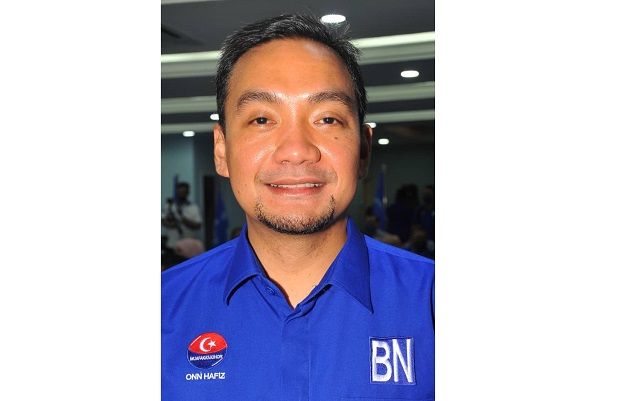
Onn Hafiz tipped to be sworn-in as new Johor MB at 3pm Tuesday…
IT is clear that there is a strong sense of dejection among Umno leaders, especially those from Johor, after their preferred choice of Mentri Besar was not picked by Sultan Ibrahim Ibni Almarhum Sultan Iskandar.
It came as a shock that the Johor Ruler picked Datuk Onn Hafiz Ghazi (pic) over party favourite Datuk Seri Hasni Mohammad.
Hasni admittedly is a popular figure, within Umno and the ground, and an experienced politician, with a good track record.
Umno president Datuk Seri Dr Ahmad Zahid Hamidi and his deputy Datuk Seri Mohamad Hasan must have thought Hasni would be automatically accepted by the palace when they submitted a list with three names – Hasni, 62, Onn Hafiz, 43, and veteran Umno leader Datuk Mohd Puad Zarkashi, 64.
But the Umno leaders were stunned when accountant Onn Hafiz was picked by His Majesty.
They left the palace in a gloomy mood, understandably, but the reality is that the Ruler has the right and authority to decide who should be the Mentri Besar. It’s laid out in the state constitution.
Johor was the first in the country to have a state constitution, dating back to 1895.
Terengganu was second, with its constitution formulated 20 years later.
Article 7(2) of the Johor constitution states that the Ruler may act in his discretion in the appointment of an MB.
The constitution also stipulates that the Ruler shall appoint an MB who must be of the Malay race and a Muslim.
According to palace sources, as in the past, the winning party would submit a list of two or three names to the Sultan to decide. Often, the list has only two names.
During the just-concluded Johor state election, Hasni was projected as the “poster boy”, indicating that he would be the MB. When Barisan Nasional swept to victory on March 12, Hasni was immediately declared as the MB candidate.
But it didn’t go down well with the palace which felt the BN leaders had pre-empted the authority of His Majesty and did not take into consideration that the decision should be made by Sultan Ibrahim alone.
By projecting Hasni as the “poster boy”, Umno leaders had inadvertently given the impression to the palace that they had usurped Sultan Ibrahim’s powers under the state constitution.
Unwittingly, the move was regarded as an obstinate one.
The purported action by Johor Umno leaders to get 38 signed statutory declarations (SDs) in support of Hasni’s appointment turned out to be mere media reports in the end. It wouldn’t have helped and Johor Umno leaders are more mature and realistic.
The palace also had other reasons in mind for a change – the Ruler wanted someone younger but qualified.
Onn Hafiz, whose name was also on the list, fitted the bill.
His grandfather was the late Tun Hussein Onn, the country’s third Prime Minister while Umno founder Onn Jaafar was his great-grandfather. Defence Minister Datuk Seri Hishamuddin Hussein is his uncle.
Palace sources said the blood lineage was not a consideration although the media has hyped it.
While he lacks the experience, the sentiment of the palace is that the political dynamics were changing with younger politicians, whether in government and opposition, emerging into leadership.
The state has seen over 700,000 Undi18 voters as well as those aged 21 who had been registered for the first time. The number will grow higher over the next five years into millions.
“Hasni will be 67 by the time he finishes his full five-year term as MB,” an official said.
Without doubt, emotions are still high among the Umno rank-and-file in the run-up to the party general assembly, but like a true Johorean, Hasni understood the realities.
In a statement, the former MB said: “Seeing the support and position of the younger generation who are important in the development of Johor, and for the state’s lasting prosperity, I suggest the party leadership elect young people to lead Johor.”
Ever the gentleman, Hasni was also at the palace today to see Onn Hafiz being sworn in as the new MB.
Onn Hafiz now has a huge responsibility and big shoes to fill. Those who know him can vouch that he didn’t even want to be a state assemblyman, being the last name to be slotted in as a candidate.
He had preferred to contest for a parliamentary seat and be an MP. He will now have to prove himself as MB.





